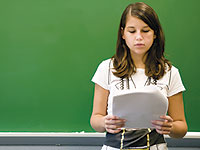Located in the northern district of Stanly County, North Carolina, New London Choice Middle School is a small K–8 school that enrolls only 353 students, yet the student body represents a wide spectrum of academic needs ranging from learning disabled to academically gifted.
The administrators and staff members at the school, a North Carolina School of Distinction with High Growth, make academic growth a school-wide priority. One strategy that promotes student success is student-led conferences in grades 6–8.
During the first month of school, sixth grade students are required to prepare a target goal sheet listing their academic strengths and study habits. They use this information to determine their academic goals as well as the strategies to make the goals a reality. Students also identify those individuals who might help them attain those goals. As students list their strategies for success, they also consider any distractions or obstacles along the way.
This target goal sheet becomes a student-authored contract that outlines student goals. Students must sign the contract and have it signed by their parents and teacher, making it a partnership in student learning between student, parent, and teacher.
Next, students begin working on their student portfolios of work collected throughout the semester. These are the focal point of the student-led conferences, which are held two or three times in the sixth grade. Students are responsible for completing the assignments that will be featured in the portfolio; missing assignments or incomplete assignments are evidenced by a “missing assignment” sheet in the portfolio, thus alerting parents to the incomplete work.
Presenting Themselves
During the student-led conference, the students present their portfolios of graded schoolwork in all subject areas. In addition to explaining the work, students discuss with their parents the correlation between their grades and their goals for academic success. During this time, teachers roam throughout the conference room to help answer questions and offer input. However, ultimate control of the conference remains the student’s responsibility.
JoAnn Everhart, sixth grade math teacher at NLCMS, is pleased with the parent participation in student-led conferences. “There are many positive benefits for students and parents participating in SLCs. The benefit that always stands out for me is the chance for a student to share his or her accomplishments with a parent with just the two of them. Everyone is so busy and the SLC gives our parents a chance to share their child’s successes in an unhurried manner.”
At the end of the conference, parents complete a questionnaire about the effectiveness of the conference and conference style. The questionnaire prompts feedback regarding student preparedness, parent understanding of the student’s progress, parent understanding of the student’s efforts and study skills, as well as suggestions and strategies for future conferences.
Success Through Accountability
The positive parent responses to the sixth grade student-led conferences led to their implementation at the seventh and eighth grades as well.
The seventh graders conduct student-led conferences during the first nine weeks of school. Barbara Fine, a seventh grade language arts teacher at NLCMS, explains that the idea is to provide a variety of conference styles for parents and students. “We like to sit down with the parents [during the second nine weeks]. For the third nine weeks, we ask that parents go through student-led conferences at home and contact us if they want a conference.” This variety of conference types provides parents more opportunity to express their concerns, she says.
The eighth grade teaching staff incorporated student-led conferences into their conference schedule to prompt academic success through student accountability.
Jennifer O’Neil, eighth grade math teacher, is delighted with the success of eighth grade conferences, stating, “Many times in a regular conference, parents just have the opportunity to hear from the teachers and see their child through the teachers’ eyes. Student-led conferences allow the parents to confront or praise their child for the work he or she has done. There is little need for a teacher to explain a low or high grade when the parents have all the work on the table in front of them.”
Eighth grade science teacher Russell Dulin says, “For the most part, this interaction between students and parents is constructive and helps the home and school work as a team toward a common goal. I believe these conferences force parents and students to talk about their school work.”
It’s Win-Win
In many cases, the increased dialogue between students and parents regarding the portfolio is different from what the parent expected.
Eighth grade language arts teacher Jacqueline Hart, who is also a parent of an NLCMS student, shares: “As a parent, I really liked the fact that my kids were responsible for telling me about their work. I enjoyed watching them present their notebook and I saw that they not only had to work all nine weeks to get the grade, but that it was important to be organized in their notebooks as well. I was able to see exactly what they were working on, and if their grade was not up to our standards, I was able to ask if they didn’t understand the material or if they just did not put forth the effort needed to do the work. My kids enjoyed it.”
In addition to promoting student accountability and increasing the lines of communication between student, parent, and school, we believe student-led conferences affect attendance. Although our data do not show a direct correlation, attendance at New London Choice Middle School is at an all-time high and tardies are decreasing.
NLCMS Principal Jency Speight is sure there is a connection to student-led conferences and overall improvement: “Even though student-led conferences are not directly linked to our increasing academic achievements, I do feel they are a factor,” he says.
Previously published in Middle Ground magazine, October 2010
Samuel A. DePaul is superintendent of Stanly County Schools in North Carolina. E-mail: samuel.depaul@stanlycountyschools.org
Sandra E. Carter is principal at North Stanly High School. E-mail: sandra.carter@stanlycountyschools.org
